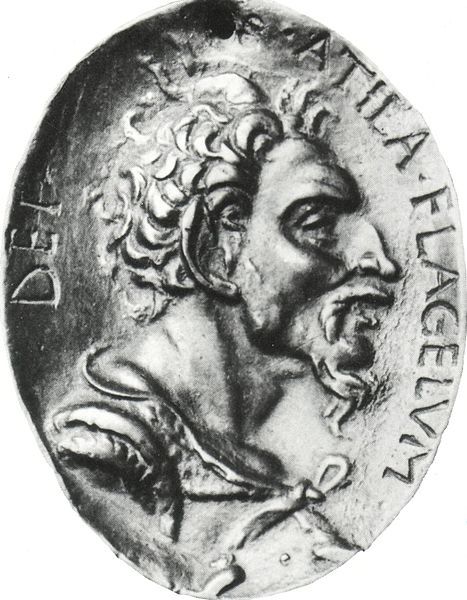Attila ruled from 433 until his death in 453. Orginally his brother Bleda ruled half the tribe and Atilla the other, until Bleda's death in 447 when Atilla became the sole King.
(Public domain image sourced from Wikipedia)
Attila was known as Flagellum Dei by the Romans (Scourge of God). He spent much of his reign waging war across Europe, burning and pillaging in his wake. His actions are partially behind the fall of the Roman Empire. At its height Attila's empire stretched from the Ural river to the Rhine.
However it's Attila's death which is of interest today.
Given all of this occurred in the 1st century accounts of Attila's health are patchy at best. However it is known that following a large feast to celebrate his latest marriage, the King was found the following morning choked to death on a pool of blood.
Later accounts suggested his wife had perhaps had murderous intentions. This is possible, but given the description that Attila had choked, seems unlikely.
Commonly held accounts of Attila's death are that while lying in a druken stupor he had suffered a nosebleed then suffocated to death on the blood. This is possible. However I support a different theory.
Like many men in that era, particularly those that embraced Attila's particular lifestyle, heavy alcohol use was a regular way of life. Chronic alcohol abuse has many destructive effects on the body. While many people will automatically think of death from liver failure, a far more common cause of death is bleeding from dilated vessels in the oesophagus ("food tube"). In chronic alcoholism the liver becomes cirrhotic, essentially scarred. Blood has to move more slowly through scarred tissue, causing it to back up in the preceding blood vessels including those around the oesophagus. (Oesophageal varices).
This is complicated by the fact that the liver also makes clotting factors. In someone who has enough liver damage to cause varices, slow or abnormal clotting is also very likely.
These dilated vessels can bleed, particularly just after a binge drinking episode on top of ongoing chronic alcoholism. Even in this day and age bleeding from oesophageal varices can be incredibly difficult to manage. Unlike a bleeding cut, you can't put direct pressure on an oesophagus. They need a surgeon, a gastroscopy and banding.
None of these were present in the 1st century.
I think it very likely that Attila the Hun bled to death from his oesophageal varices.
All that death, destruction, wine, women and song eventually caught up with him.
Clearly there are some bad sides about being a drunken despot.

That sounds every bit as pleasant as the man himself!
ReplyDeleteSounds delightful!
ReplyDeleteYour final line reminded me of something I heard recently - "I spent all of my money on wine, women and song... and squandered the rest".